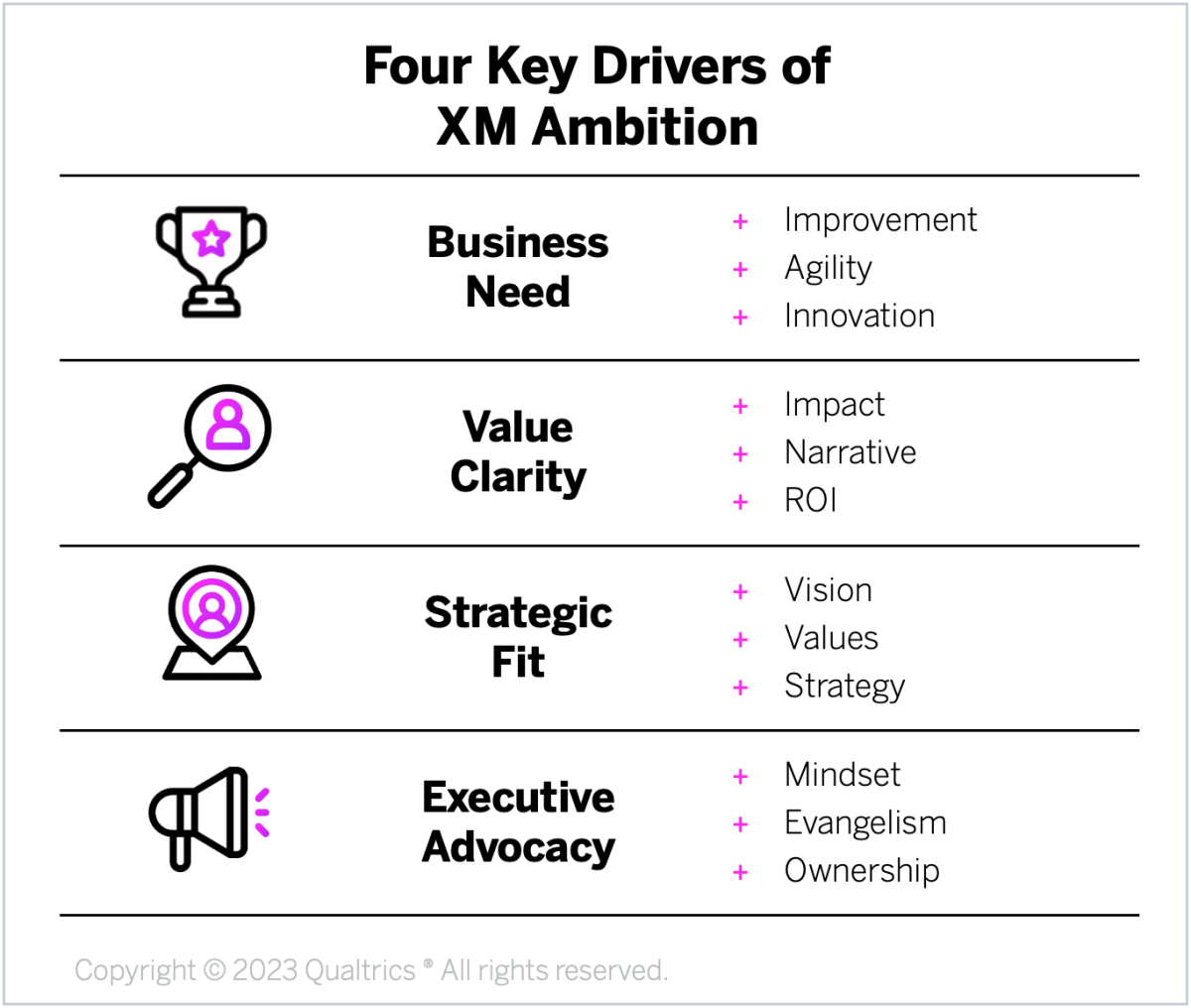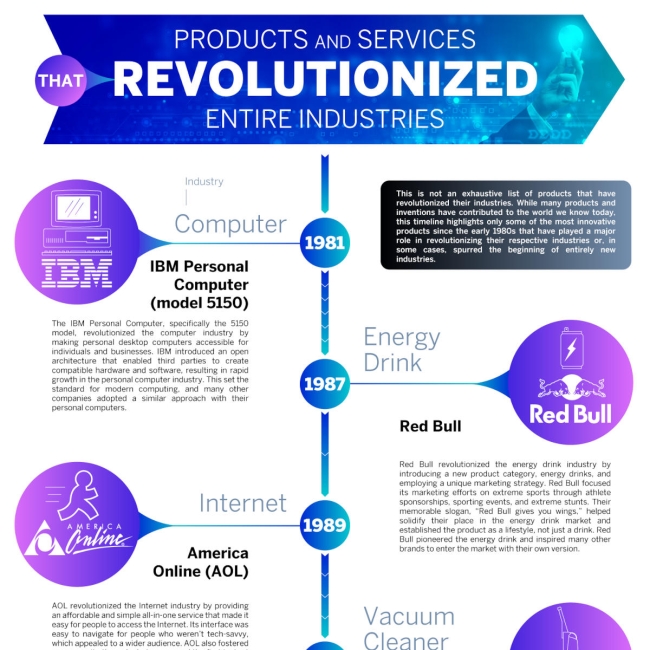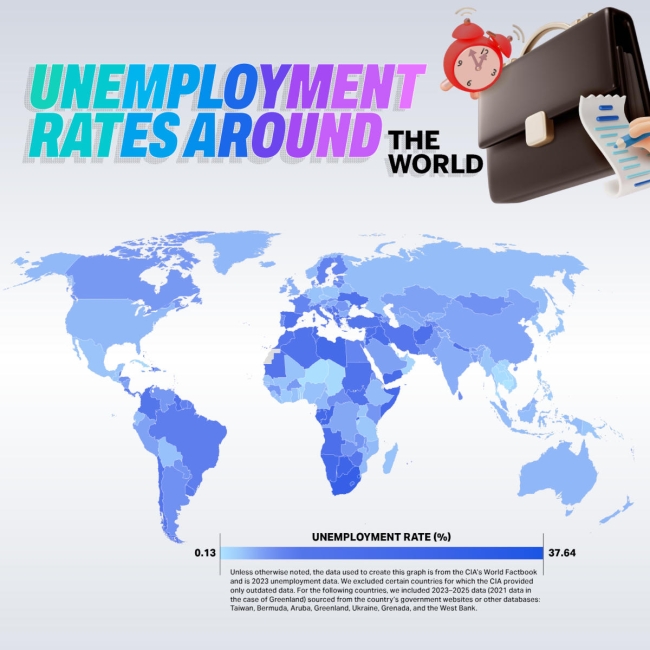Driving this level of change requires strong, persistent commitment from executives who can help overcome the rampant obstacles and inevitable inertia that set in during any large-scale transformation.
We’ve seen a lot of senior executives say that they are committed to their organization’s XM efforts, yet many of them don’t provide the necessary level of support throughout the multi-year period that it takes to drive transformation. It’s not that those leaders are insincere, it’s just that they lack a deep belief that XM is critical to their organization’s long-term success. Without this high level of XM ambition, executives’ commitment to XM can wane as they face inevitable shifts in their operating environment.
Since XM ambition ensures ongoing senior leadership support, it represents a necessary ingredient for achieving long-term XM success. The ultimate goal is to combine XM ambition with a systematic approach to embedding XM-centric capabilities across the business, which XM Institute calls the XM Operating Framework (XMOF). The XMOF includes the Competencies needed to drive the change, the Technology to scale the change, and the Culture to nurture the change.
So how can you tell if your senior leaders have the XM ambition necessary to support your XM goals and activities? By taking the XM Ambition Assessment we developed to help XM professionals drive the leadership discussions they need to evaluate – and hopefully secure – the resources and support necessary for long-term program success.
Assessing Executive Ambition
XM Institute has identified four drivers of XM Ambition: Business Need, Value Clarity, Strategic Fit, and Executive Advocacy. To provide clarity around this topic, we’ve created an Ambition Assessment, which examines 12 distinct characteristics across those four drivers.

Business Need
Senior leaders believe that the organization needs to adapt how it operates to succeed in a changing and uncertain environment.
Because XM embeds the capability to continuously learn, propagate insights, and rapidly adapt throughout all operational processes, it enables organizations to sense and respond to changes more quickly than their competitors can. While the exact opportunities presented by XM will vary depending on a number of factors – like industry, region, and regulatory environments – the ability to better understand and adapt to an ever-evolving business landscape is always crucial for long-term success. Executives will demonstrate stronger ambition when they recognize this link between XM and their organization’s ability to stay competitive. To evaluate Business Need, we examine:
- Improvements. Senior leaders recognize a business need to improve broken experiences because they are costly or competitively problematic
- Agility. Senior leaders recognize a business need to improve the organization’s ability to adapt to changing environments that it is currently facing or will be facing in the future
- Innovation. Senior leaders recognize a business need to accelerate the pace and success of its innovations to meet its growth and market share objectives
Value Clarity
Senior leaders can clearly articulate where and how XM can transform their organization.
Even if executives recognize the potential business value of XM efforts, they may lack ambition if they don’t have a good sense of how these efforts will translate into success. Leaders need to have and communicate a compelling vision of the desired future state, explaining how exactly XM will help different processes, teams, and business operations perform better going forward. To evaluate Value Clarity, we examine:
- Impact. Efforts that improve XM are viewed as a requirement for the organization to succeed in the future
- Narrative. There is a compelling story about how an improvement in XM will change how the organization operates in the future
- ROI. There is an accepted model for estimating the value of improving XM
Strategic Fit
The organization embraces XM within its core operating model.
Since XM success requires organizations to maintain a systematic focus on driving change over multiple years, leadership ambition needs to last for an extended period of time. This sustained focus will only persist if executives – and people across the business – see XM as integral to the organization’s critical efforts and not as a standalone set of activities. To evaluate Strategic Fit, we examine:
- Vision. The organization’s vision statement includes a clear connection to XM
- Values. The organization has well-defined values that can clearly be connected to XM
- Strategy. The organization’s strategic plans include specific areas that focus on XM
Executive Advocacy
Senior leaders actively support the organization’s strong focus on XM.
Even if leaders believe that XM is important, their endorsement is meaningless unless it consistently shows up in their own decisions and actions. Because people naturally gravitate toward the status quo, if executives don’t demonstrate XM behaviors themselves – if they don’t highlight, encourage, and reward XM adoption – the rest of the organization won’t change the way it operates either. To evaluate Executive Advocacy, we examine:
- Mindset. Senior leaders view XM as a multi-year cross-functional transformational program
- Evangelism. Senior leaders actively evangelize the importance of XM
- Ownership. Senior leaders allocate resources and promote XM-related activities within their organizations
Using The XM Ambition Assessment
Use this assessment to identify the relative strengths and weaknesses of your senior leaders’ XM ambition across these four drivers. The goal is not to focus on an absolute score but rather to use the results to facilitate discussions with senior leaders in order to enlist the support you need to drive XM success. Here’s how we recommend using this assessment:
- Self-assessments. Take the test yourself and identify the strengths and weaknesses of your senior executives’ ambitions. You can also use the evaluation to assess leaders from different departments or business units.
- Group discussions. Have multiple people complete the assessment and then review the results as a group. Discuss the strong and weak elements you’ve identified as well as which areas you all agree on and which areas you disagree on.
- Action planning. During a working session with senior leaders, have the group identify whether or not their level of ambition is appropriate for the XM efforts that are being envisioned. If it’s not, have them identify explicit steps they can take to strengthen their ambition or support.
- Progress tracking. Repeat the assessment every 12 to 18 months to track your progress and identify key areas of focus. The goal is to drive an ongoing discussion and sustain the executive ambition required to support your XM efforts.
The bottom line. Executive ambition is a necessary ingredient for long-term XM success.



